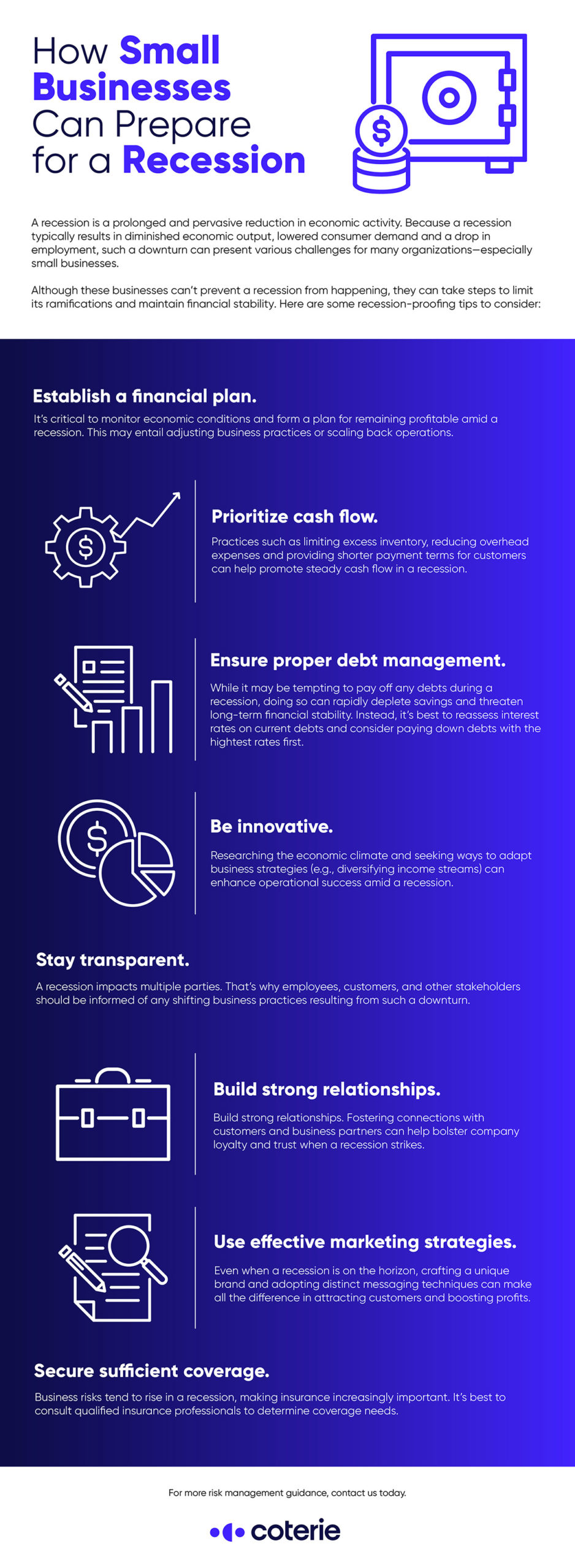Rising costs, layoffs and an uncertain stock market are on many Americans’ minds. As you may be hearing from your small business clients, many owners are wondering if a recession is around the corner.
A recession is a long and widespread decrease in economic activity. During a recession, companies of all types and sizes experience decreased sales and profits due to changing customer attitudes.
As an insurance agent, you may know that small businesses are particularly vulnerable during times like these as they generally lack the funds needed to survive extended periods of loss. To promote financial stability during an economic downturn, consider sharing the following tips to help your small business clients recession-proof their operations:
- Establish a financial plan. It’s critical to closely monitor current economic conditions and form a plan for remaining profitable amid a recession, whether this means adjusting specific business practices or scaling back certain operations. Having such a plan in place will help eliminate unnecessary spending and highlight investment priorities. A sound financial plan should also include adequate insurance coverage to protect their business assets and operations.
- Prioritize savings and cash flow. In addition to having a solid financial plan, building up reserves and maintaining a steady cash flow will help your clients successfully navigate an economic downturn. This may include limiting excess inventory, finding ways to reduce overhead expenses, implementing shorter payment terms for customers and even encouraging early or advance payment options.
- Manage debt. While it may be tempting to pay off any debts in the face of a recession, doing so can rapidly deplete reserves and threaten long-term financial stability. Instead, it’s best to reassess interest rates on current debts and consider paying down debts with the highest rates first. If reserves are already low, consider advising your clients to use additional financing options and establishing a line of credit.
- Diversify revenue streams. Having multiple revenue streams can help insulate small businesses from the fluctuations of a single market or industry. By expanding into new markets or developing new products or services, small business owners can increase their chances of weathering an economic downturn.
- Look for opportunities. A recession can also present opportunities for those who can be flexible. With many larger companies struggling, small businesses may be able to pick up new customers or contracts by offering competitive prices and quality services.

While no one can prevent a recession from happening, business owners can take steps to limit its impact and maintain financial stability. Establishing a financial plan, prioritizing savings and cash flow, ensuring proper debt management, diversifying revenue streams and looking for opportunities, can prepare small businesses for an economic downturn and increase their chances of success.
As a trusted adviser, help small business clients recession-proof today by starting the conversation with them and be sure to include adequate insurance coverage as a talking point.





